考研英语语义练习
语言学第五章语义学考研真题

Chapter Five: SemanticsI. 名词解释1.(南开大学2001,中山大学2004年考题)hyponymy考点分析:考查“上下义关系”的定义Answer: Hyponymy refers to the sense relations between a more general, more inclusive words and a more specific word. The word that is more general in meaning is called the superordinate, and the more specific words are its hyponyms.2. (南开大学2000年考题) sense考点分析:“意义”的定义Answer: Sense is concerned with the inherent meaning of a linguistic form. It is the collection of all the features of the linguistic form; it is abstract and decontextualized. It is the aspect of meaning dictionary compilers are interested in. for example, the word dog is given the definition ―a domestic canine animal, occurring in many breeds that show a great variety in size and form‖. This does not refer to any particular dog that exists in the real world, but applies to any animal that meets the features described in the definition. So this is the sense of the word dog.3. (华南理工大学2004年考题) reference考点分析“所指/参照”的定义Answer: Reference means what a linguistic form refers to in the real, physical world; it deals with the relationship between the linguistic element and the nonlinguistic world of experience. If we say ―The dog is barking‖, we must be talking about a certain dog existent in the situation; the word dog refers to a dog known to both speaker and the hearer. This is the reference of the word dog in this particular situation.4.(华南理工大学204年考题) interlanguage考点分析“中介语”的定义Answer: The type of language constructed by second or foreign language learners who are still in the process of learning a language is often referred to as interlanguage. As the name suggests, interlanguage is a language system between the target language and the learner’s native language. It is imperfect compared with the target language, but it is not mere translation from the learner’s native language.5.(中山大学2003年考题)error analysis考点分析:“错误分析”的定义Answer: Error analysis is the study and analysis of error and is confined to the language learner. Here, ―error‖ refers generally to the learner’s grammatical or pragmatic misuse or misunderstanding of the target language.II. 判断正误1.(大连外国语学院2001年考题)―Kids‖and ―children‖are synonyms despite their stylistic difference考点分析:同义关系的辨别Answer: T2. (大连外国语学院2002年考题) In the following pair of sentences, Sentence (a) presupposes Sentence (b)(a)John managed to finish in time(b)John tried to finish in time.考点分析:判断句子之间有何种意义关系Answer: T3. (东南大学2003年考题)If a word has sense, it must have reference.考点分析:考查sense 和reference之间的对应关系.(Note: Every word has a sense, but not every word has a reference.)Answer: F4. (上海外国语大学2000年考题) Regardless of their ethnic and cultural backgrounds, children of all colors and societies follow roughly the same route/order of language development, though they may differ in the rate of learning.考点分析:语言习得过程的普遍特点Answer: T5. (吉林大学2000年考题)Overgeneralization is a common error made by an early foreign language learner.考点分析:考查“语法规则过度概括”在什么情况下产生。
03.考研英语二阅读讲义-语意理解题
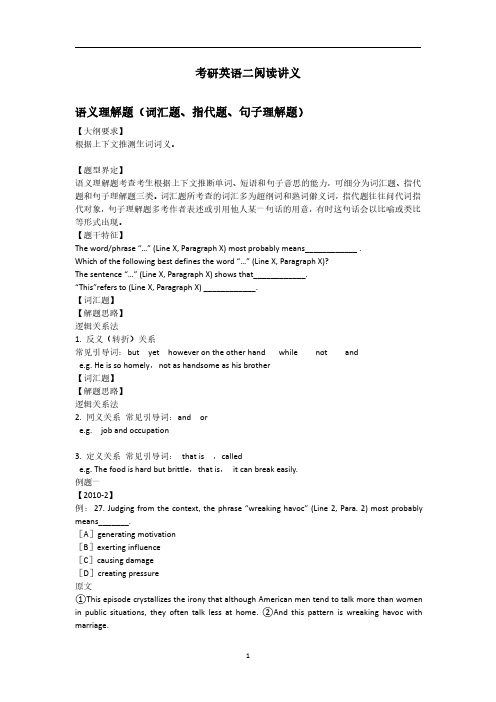
考研英语二阅读讲义语义理解题(词汇题、指代题、句子理解题)【大纲要求】根据上下文推测生词词义。
【题型界定】语义理解题考查考生根据上下文推断单词、短语和句子意思的能力,可细分为词汇题、指代题和句子理解题三类。
词汇题所考查的词汇多为超纲词和熟词僻义词,指代题往往问代词指代对象,句子理解题多考作者表述或引用他人某一句话的用意,有时这句话会以比喻或类比等形式出现。
【题干特征】The word/phrase“…”(Line X,Paragraph X)most probably means____________.Which of the following best defines the word“…”(Line X,Paragraph X)?The sentence“…”(Line X,Paragraph X)shows that____________.“This”refers to(Line X,Paragraph X)____________.【词汇题】【解题思路】逻辑关系法1.反义(转折)关系常见引导词:but yet however on the other hand while not ande.g.He is so homely,not as handsome as his brother【词汇题】【解题思路】逻辑关系法2.同义关系常见引导词:and ore.g.job and occupation3.定义关系常见引导词:that is,callede.g.The food is hard but brittle,that is,it can break easily.例题一【2010-2】例:27.Judging from the context,the phrase“wreaking havoc”(Line2,Para.2)most probably means_______.[A]generating motivation[B]exerting influence[C]causing damage[D]creating pressure原文①This episode crystallizes the irony that although American men tend to talk more than women in public situations,they often talk less at home.②And this pattern is wreaking havoc with marriage.①The pattern was observed by political scientist Andrew Hacker in the late1970s.②Sociologist Catherine Kohler Riessman reports in her new book Divorce Talk that most of the women she interviewed—but only a few of the men—gave lack of communication as the reason for their divorces.③Given the current divorce rate of nearly50percent,that amounts to millions of cases in the United States every year—a virtual epidemic of failed conversation.例题二【2012-4】例:36.By saying“to find silver linings”(Para.2)the author suggests that the jobless try to_________.[A]seek subsidies from the government[B]make profits from the troubled economy[C]explore reasons for the unemployment[D]look on the bright side of the recession原文①No one tries harder than the jobless to find silver linings in this national economic disaster.②Many said that unemployment,while extremely painful,had improved them in some ways: they had become less materialistic and more financially prudent;they were more aware of the struggles of others.③In limited respects,perhaps the recession will leave society better off.④At the very least,it has awoken us from our national fever dream of easy riches and bigger houses,and put a necessary end to an era of reckless personal spending.例题三【2016-1】例:25.The word“coax”(Para.6)is closest in meaning to____.A.persuadeB.frightenC.misguideD.Challenge原文①Indeed,the Flatiron students might not go into IT at all.②But creating a future army of coders is not the sole purpose of the classes.③These kids are going to be surrounded by computers—in their pockets,in their offices,in their homes—for the rest of their lives.④The younger they learn how computers think,how to coax the machine into producing what they want—the earlier they learn that they have the power to do that—the better.【指代题】【解题思路】(1)返回原文,找到该指代词(2)向上搜索,找最近的名词,名词性短语或句子(3)将找到的词、词组或者句子带入替换该指代词,看其意思是否通顺“向上搜索,进行带入”例题一【2013-2】例:26.“Birds of passage”refers to those who.[A]stay in a foreign country temporarily[B]leave their home countries for good[C]immigrate across the Atlantic[D]find permanent jobs overseas原文①A century ago,the immigrants from across the Atlantic included settlers and sojourners.②Along with the many folks looking to make a permanent home in the United States came those who had no intention to stay,and who would make some money and then go home.③Between1908and1915,about7million people arrived while about2million departed.④About a quarter of all Italian immigrants,for example,eventually returned to Italy for good.⑤They even had an affectionate nickname,“uccelli di passaggio,”birds of passage.【句子理解题】【大纲要求】理解句子在文中的含义【句子理解题】【解题思路】返回原文,找到该句,根据上下文的逻辑关系进行推断(即考虑该句所在段落中句与句的逻辑关系),或直接结合文章主旨题解题。
考研英语一阅读练习题

考研英语一阅读练习题一、事实细节题1. According to the first paragraph, what is the main challenge faced today's college graduates?2. In the second paragraph, the author mentions that__________ is a key factor in job placement.3. Which of the following statements is TRUE according to the third paragraph?4. The author gives the example of Company X toillustrate __________.二、词义猜测题1. The word "entrenched" in Paragraph 2 is closest in meaning to __________.2. In Paragraph 4, the phrase "break the mold" mostlikely means __________.3. The term "lateral thinking" in Paragraph 5 can be best understood as __________.三、推理判断题1. It can be inferred from the first paragraph that__________.2. The author's attitude towards the current job marketis __________.3. Based on the information in Paragraph 3, we can conclude that __________.四、主旨大意题1. What is the main idea of the second paragraph?2. What is the overall theme of the passage?3. Which of the following best summarizes the author's purpose in writing this article?五、观点态度题1. The author's opinion on the importance of internships is __________.2. In the author's view, the role of __________ in career success is __________.3. The author's tone when discussing the challenges of college graduates can be described as __________.六、篇章结构题1. The function of the first paragraph is to __________.2. The author uses the example in Paragraph 4 to__________.3. The structure of the passage can be best described as __________.七、长难句理解题1. In the following sentence, what does the author mean "the socalled 'hidden job market'"?"Many job seekers overlook the socalled 'hidden job market', which accounts for a significant portion of total employment opportunities."2. What is the author's point in the following sentence?"While a strong academic background is important, it is not the sole determinant of career success."八、信息匹配题1. Which paragraph discusses the impact of social media on job hunting?2. In which section does the author talk about the benefits of networking?3. Which part of the article provides advice on how to tailor a resume for different job applications?九、逻辑推理题1. If the author's claim in Paragraph 5 is true, which of the following would most likely be the consequence?2. The author suggests that without __________, it would be difficult for graduates to __________.3. Which of the following steps should be taken first according to the author's advice for job seekers?十、细节理解题1. According to the article, what percentage of jobs are never advertised?2. The author mentions several skills that are highly valued employers; which skill is mentioned as being crucial for problemsolving?十一、语义理解题1. What does the author imply when saying "the landscape of employment has shifted dramatically"?2. The phrase "think outside the box" in Paragraph 6 suggests that job seekers should __________.3. In the context of the article, what does "soft skills" refer to?十二、论点论据题1. Which of the following serves as evidence to support the author's claim about the importance of continuous learning?2. The author uses __________ as an example to illustrate the significance of adaptability in the workplace.3. What is the main argument against relying solely on online job portals for job search?十三、归纳题1. What would be the best of the passage?2. If the second section of the article were to be d, which of the following would be most appropriate?3. Choose a sub for the last paragraph of the article.十四、引申推断题1. Based on the passage, what might be a future trend in the job market?2. If the author were to continue the article, what topic might be discussed next?3. What advice can be inferred for those who are considering a career change?答案一、事实细节题2. Networking and personal connections.3. (Answer depends on the content of the third paragraph, which is not provided.)4. The importance of practical skills in the workplace.二、词义猜测题1. Established or firmly established.2. Think in an unconventional way or innovate.3. Thinking that moves laterally or creatively to solve problems.三、推理判断题1. (Answer depends on the content of the first paragraph, which is not provided.)2. Concerned but optimistic.3. (Answer depends on the content of the third paragraph, which is not provided.)四、主旨大意题1. (Answer depends on the content of the second paragraph, which is not provided.)2. Navigating the job market as a new graduate.3. (Answer depends on the overall theme of the passage, which is not provided.)五、观点态度题1. Positive.2. Continuous learning / crucial.3. Understanding and empathetic.六、篇章结构题1. To introduce the topic and present the main challenge.2. To illustrate the importance of thinking outside the box.3. Problemsolution structure.七、长难句理解题1. Jobs that are not publicly advertised but can be found through networking and other informal channels.2. Academic background alone is not enough for career success.八、信息匹配题1. Paragraph 4.2. Section discussing career development strategies.3. Part where resume customization is advised.九、逻辑推理题1. Increased emphasis on practical skills in education.2. Continuous learning / stay relevant in the job market.3. Identifying one's career goals.十、细节理解题1. 7080%.2. Critical thinking.3. Subscribing to industry newsletters and attending webinars.十一、语义理解题1. Significant changes have occurred in how people find and secure employment.2. Be creative and innovative.十二、论点论据题1. The statistic that a certain percentage of jobs are filled through networking.2. A story of a graduate who adapted to a new industry.3. The argument that online job portals only show a fraction of available jobs.十三、归纳题1. "Navigating the Job Market: Strategies for New Graduates"2. "The Hidden Job Market: Uncovering Opportunities"3. "Adapting to Change: The Key to Career Success"十四、引申推断题1. Increased reliance on remote work and digital platforms.2. Strategies for effective job interviews.3. The importance of lifelong learning and career planning.。
英语专业考研语言学试题
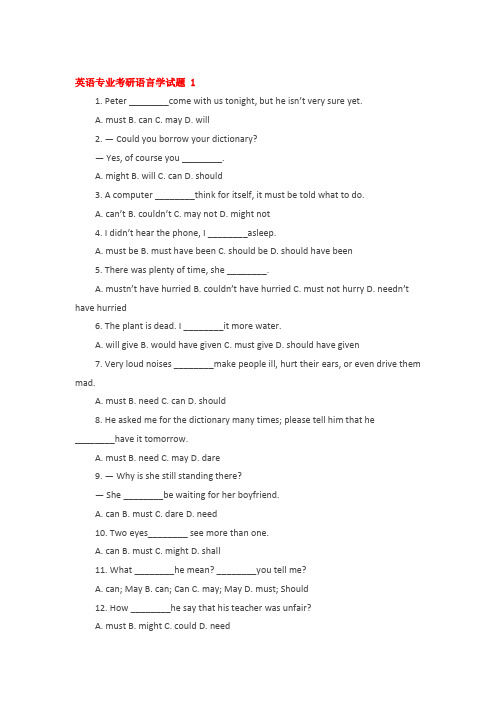
英语专业考研语言学试题 11. Peter ________come with us tonight, but he isn’t very sure yet.A. mustB. canC. mayD. will2. — Could you borrow your dictionary?— Yes, of course you ________.A. mightB. willC. canD. should3. A computer ________think for itself, it must be told what to do.A. can’tB. couldn’tC. may notD. might not4. I didn’t hear the phone, I ________asleep.A. must beB. must have beenC. should beD. should have been5. There was plenty of time, she ________.A. mustn’t have hurriedB. couldn’t have hurriedC. must not hurryD. needn’t have hurried6. The plant is dead. I ________it more water.A. will giveB. would have givenC. must giveD. should have given7. Very loud noises ________make people ill, hurt their ears, or even drive them mad.A. mustB. needC. canD. should8. He asked me for the dictionary many times; please tell him that he________have it tomorrow.A. mustB. needC. mayD. dare9. — Why is she still standing there?— She ________be waiting for her boyfriend.A. canB. mustC. dareD. need10. Two eyes________ see more than one.A. canB. mustC. mightD. shall11. What ________he mean? ________you tell me?A. can; MayB. can; CanC. may; MayD. must; Should12. How ________he say that his teacher was unfair?A. mustB. mightC. couldD. need13. It ________be very cold in this part.A. canB. oughtC. shallD. dare14. I’d like to ask a question if I ________.A. mustB. willC. mayD. might15. Even in summer the temperature ________suddenly drop below freezing.A. mightB. oughtC. mustD. need16. He decided to join the army so that he ________defend the country.A. may helpB. might helpC. helpsD. helped17. You ________always be talking like that.A. mightn’tB. mayn’tC. can’tD. mustn’t18. The car ________have broke down just when we were about to start off.A. mustB. couldC. mightD. should19. You ________see him while he is in hospital.A. have betterB. had betterC. would ratherD. had to20. There is a fine sunset; it ________to be a fine day tomorrow.A. oughtB. shouldC. has toD. has better21. You are his father, you ________take care of him.A. mightB. oughtC. ought toD. are able to22. That’s all. It ________be talked about any more.A. needn’tB. mightn’tC. darn’t toD. needn’t to23. The question ________discussing.A. needsB. needC. can beD. must be24. He ________even look out of the window.A. daren’tB. daresn’tC. dared not toD. dares not25. I’m so hungry that I ________find something to eat.A. have toB. wouldC. mayD. can26. All the students ________do their best for the modernization of our country.A. canB. shouldC. mayD. might27. You ________be careful with your homework.A. mustB. have toC. mayD. are used to28. It is getting darker. You ________not go home.A. had betterB. have betterC. would ratherD. would like29. I ________what happened to our school.A. would like knowB. would like to knowC. would like knowingD. would like that I know30. — Would you mind my changing the plan?— ________.A. Oh, no, pleaseB. Yes, I mind notC. No, I wouldD. Yes, I will31. — It ________ be Jack who is in the library.—I’m sure it ________be him, I saw him off at the railway station just two days ago.A. can’t; can’t eB. must; mustn’tC. must; can’tD. can’t; mustn’t32. I ________tell her the truth about his marriage.A. can’t helpB. can’t butC. may not helpD. mustn’t but33. Since she is angry, we ________.A. had better to leave her alongB. should leave her aloneC. would rather to leave her aloneD. must leave her alone34. Look! What you’ve done to me. You ________more careful.A. maybeB. had toC. should have beenD. would be35. ________read the letter for you?A. Would you like meB. Do you want meC. Will you mind meD. Shall I36. He promised he ________not make such silly mistakes.A. wouldB. shouldC. mightD. could37. ________it be true that his father will go abroad?A. CanB. MayC. NeedD. Should38. Those streams are so small that they ________be shown in the maps.A. mustn’tB. may notC. can’tD. may39. — May I use your bike?— ________.A. No, you may notB. No, you mustn’tC. No, you won’tD. Sorry, I’m afraid not40. — Must I write to her?— No, you ________.A. mustn’tB. shouldn’tC. can’tD. don’t have to41. — Need I start tonight?— Yes, you ________.A. doB. needC. mustD. may42. The old man ________sit for hours watching the ships.A. wouldB. shouldC. was used toD. would rather to43. If the telephone ________ring, please wake me up.A. wouldB. shouldC. willD. might44. I wish they ________stop making remarks about me.A. wouldB. willC. shouldD. shall45. You’re thirsty, aren’t you? ________he get some coffee?A. DoesB. ShallC. WouldD. Let46. Which of the following is wrong?A. That may be true.B. That might be true.C. That can be true.D. That could be true.47. — Would you lend me some money?— Yes, I ________.A. wouldB. willC. canD. may48. He ________ swimming when he was young.A. was used to goB. got used to goC. used to goingD. used to go49. You say you ________ not do it, but I say you ________do it.A. will; shallB. shall; shallC. shall; willD. will; will50. You ________out yesterday without a coat. No wonder you caught cold.A. should have goneB. shouldn’t have goneC. could not have goneD. might have gone51. He ________the 8:30 train because he didn’t leave home until 9:00.A. can’t catchB. couldn’t catchC. may notD. can’t have caught52. You ________us this because we had more than enough.A. needn’t bringB. needn’t have broughtC. mustn’t bringD. couldn’t have brought53. — He learnt the language in three months.— He ________very hard.A. must workB. might have workedC. must have workedD. might work54. — Who told you my telephone number?—I don’t remember. It ________Mary.—It can’t be Mary, she doesn’t know it.A. may have beenB. can have beenC. must beD. can be55. You ________him, why didn’t you?A. ought to thankB. ought have thankedC. ought to have thankedD. ought thank56. I ________have arrived a little earlier, but my car broke down.A. shouldB. couldC. canD. can’t57. — ________we go out for a walk?—Great. Let’s goA. ShallB. WillC. MayD. Should58. Though she was seriously ill, she ________ complete the work in time.A. wouldB. was able toC. was possible toD. might59. — Would you like to play chess with me?— Yes, ________.A. I’dB. I wouldC. I’d likeD. I’d like to60. Tom is late. He ________the wrong bus.A. must takeB. must have takenC. might takeD. could take英语专业考研语言学试题 21. Charles Babbage is generally considered ________the first computer.A. to have inventedB. inventingC. to inventD. having invented2. Little Jim should love ________to the theatre this evening.A. to be takenB. to takeC. being takenD. taking3. — I usually go there by train.— Why not ________by boat for a change?A. to try goingB. trying to goC. to try and goD. try going4. John was made ________the truck for a week as a punishment.A. to washB. washingC. washD. to be washing5. She reached the top of the hill and stopped ________on a big rock by the side of the path.A. to have restedB. restingC. to restD. rest6. She pretended________ me when I passed by.A. not to seeB. not seeingC. to not seeD. having not seen7. Though he had often made his sister ________, today he was made________by his sister.A. cry; to cryB. crying; cryingC. cry; cryingD. to cry; cry8. Tell him ________the window.A. to shut notB. not to shutC. to not shutD. don’t’ shut9. ________her sick to think of the matter.A. That madeB. That causedC. It madeD. It caused10. The woman’s job is ________after the disable children.A. lookB. looksC. lookedD. to look11. She ________to ________everything.A. demanded; tellB. demanded; be toldC. required; tellD. required; be told12. It’s time ________our league meeting.A. to beginB. beginningC. that we beginD. that we’ll begin13. That day I was the last one ________the experiment.A. madeB. makingC. to makeD. having made14. I’m hungry. Get me something ________.A. to be eatenB. to eatC. eatingD. to be eating15. Would you ________me to show you around the place?A. letB. likeC. mindD. care16. She is said ________the necklace.A. that she lostB. that she has lostC. to loseD. to have lost17. What do you think is the best way ________the problem?A. to settlingB. in which settlingC. to settleD. settling18. You are ________retell the story.A. oughtB. ought toC. expectingD. expected to19. I didn’t want the problem ________again.A. to raiseB. to be raisedC. being raisedD. be raised20. Have you had the nurse ________your son’s temperature?A. to takeB. takingC. takeD. taken21. First we should find a hotel ________for the night.A. to put up at itB. in order to put up atC. at where to put upD. at which to put up22. ________wake me up when you come in.A. You’d better not toB. You’d better notC. You hadn’t better toD. You hadn’t better23. I don’t think you need ________ today.A. to leaveB. to be leavingC. leavingD. being left24. We have been looking for the girl all the morning, but she is no where________.A. to seeB. to be seenC. being seenD. seen25. He should ________for what he has done.A. praiseB. be praisedC. have praisedD. to be praised26. He felt a stone ________his back.A. hittingB. to hitC. hittedD. hit27. I hurried to school, only ________out it was Sunday.A. findB. to findC. foundD. would find28. Here are some exercises that need________ after class.A. doneB. to be doneC. being doneD. to do29. I’ve been waiting for half an hour ________me the phone call.A. to giveB. for you givingC. of you to giveD. for you to give30. Everything ________smoothly.A. seems goingB. seems to be goingC. is seeming to goD. is seeming to be going31. It was thoughtful ________us the map of the city.A. of you to sendB. for you to sendC. of you sendingD. for you sending32. You are fortunate ________as a member of the club.A. being acceptedB. to acceptC. To have acceptedD. to have been accepted33. ________wasn’t pleasant ________up so early.A. He; to wakeB. He; to be wakenC. It; of him to wakeD. It; to be woken34. I find these problems are easy________.A. to work outB. to be worked outC. in working outD. to be worked them out35. How rude ________him ________a child like that.A. of; to treatB. for; to treatC. of; is to treatD. for; is to treat36. It was stupid ________him ________attend the lecture.A. of; to notB. of; not toC. for; to notD. for; not to37. It was impossible ________lost time to ________.A. for; make upB. of; make upC. for; be made upD. of; be made up38. The shoes are too large ________.A. to me to wearB. for me to wearC. to me to be wornD. for me to be worn39. ________was sorry________ made such a silly mistake.A. It; to haveB. It; havingC. I ; to haveD. I; having40. I’ll be delighted ________.A. when I’ll see you againB. to see you againC. that I see you againD. to have seen you again41. He was ________tired ________any further.A. too; walkingB. too; to walkC. so; walkingD. so; to walk42. Will you be ________kind ________make tea for me?A. so; toB. fairly; toC. so; as toD. fairly; as to43. The chair looks rather hard, but in fact it is very comfortable to ________.A. sitB. sit onC. be satD. be sat on44. I ________how to answer the question.A. puzzleB. am puzzlingC. have puzzledD. am puzzled45. Have you decided ________the party?A. whether you holdB. why to holdC. whether to holdD. if to hold46. He doesn’t know ________to stay or not.A. ifB. eitherC. neitherD. whether he ought47. Last summer I took a course on ________.A. how to make dressesB. how dresses be madeC. how to be made dressesD. how dresses to be made48. He hesitated ________ the medicine.A. takingB. about to takeC. whether he takeD. whether to take49. How do the birds know exactly ________ direction ________?A. which, flyingB. which; to fly toC. in which; to flyD. X; flying to50. —I don’t know ________with the problem.— Why not ________your teacher for advise?A. what to do; to askB. how to do; to askC. what to do; askD. how to do; ask51. I think he should get a job, but you can’t force him ________ if he’s not ready ________.A. to get; toB. to get; XC. to; X D; to; to do52. — Would you like to go to the ball?— Yes, ________.A. I’dB. I’d likeC. I’d like toD. I’d like to go53. —Aren’t you in charge of this?— No, and I ________.A. don’t wantB. don’t want toC. don’t want to be D am not54. ________the truth, I don’t want to go.A. To tellB. TellC. TellingD. In order to tell55. I’d rather read something at home than ________to the park in such weather.A. goB. to goC. goingD. went56. We could do nothing but ________Father for help.A. askB. askingC. to askD. asked57. He wanted nothing but ________in the corner.A. seatB. be seatedC. be seatD. to be seated58. It ________about two years________ such a big dam.A. takes; in buildingB. takes; to buildC. needs; in buildingD. needs; to build59. How much did ________cost ________the house?A. it; in rebuildingB. he; in rebuildingC. it; to rebuildD. he; to rebuild60. ________requires patience ________a good nurse.A. She; to beB. she; if she isC. It; to beD. It; if she is。
考研英语语法词汇精练与详解
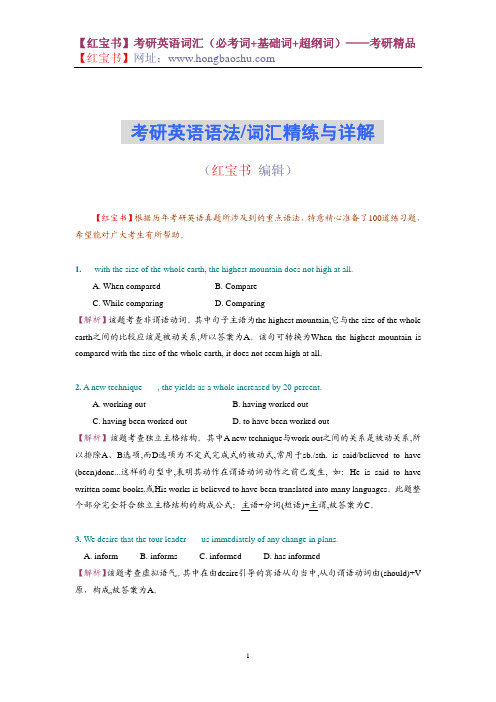
考研英语语法/词汇精练与详解(红宝书编辑)【红宝书】根据历年考研英语真题所涉及到的重点语法,特意精心准备了100道练习题,希望能对广大考生有所帮助。
1.___with the size of the whole earth, the highest mountain does not high at all.B.ComparecomparedWhenA.comparing D.ComparingWhileC.【解析】该题考查非谓语动词。
其中句子主语为the highest mountain,它与the size of the whole earth之间的比较应该是被动关系,所以答案为A。
该句可转换为When the highest mountain is compared with the size of the whole earth, it does not seem high at all。
2. A new technique ___, the yields as a whole increased by 20 percent.workedouthavingout B.workingA.C. having been worked outD. to have been worked out【解析】该题考查独立主格结构。
其中A new technique与work out之间的关系是被动关系,所以排除A、B选项,而D选项为不定式完成式的被动式,常用于sb./sth. is said/believed to have (been)done...这样的句型中,表明其动作在谓语动词动作之前已发生, 如:He is said to have written some books.或His works is believed to have been translated into many languages。
语义学练习题

Semantics1.W hat is semantics?A: Semantics examines how meaning is encoded in a language. It is not only concerned with meanings of words as lexical items, but also with levels of language bolow the word and above it, e.g. meanings of morphemes and sentences.2.What are major branches of linguistics? what does each study?A: (1).Phonetics----it’s defined as the study of the phonic medium of language, it’s concerned with all the sounds that occur in the world’s languages.(2).Phonology:the study of sounds systems—the inventory of distinctive sounds that occur in a language and the patterns into which they fall.(3).Morphology: It’s a branch of a grammar which studies the internal structure of wordsand the rules by which words are formed. (4).Syntax: It's a subfield of linguistics that studies the sentence structure of a language. (5).Semantics: It’s simply defined as the study of meaning in abstraction.(6).Pragmatics: the study of meaning in context of words.3.Two aspects of Sentence meaning:A: grammatical and semantic meaning.4.Selectional restrictions---A:Whether a sentence is semantically meaningful is governed by rules.5.How are sense and reference related?A.Sense refers to the inherent meaning of a linguistic form, which is the collection of all the features of the linguistic form, it’s abstract and de-contextualized.Reference is what a linguistic form refers to in the real, physical world, it is a matter ofrelationship between the form and reality.6.W hat’s grammaticality? what might take a grammatically meaningful sentence semantically meaningless? Grammaticality:the grammatical well-formedness of a sentence.A sentence may be well-formed grammatically, i.e. it conforms to the grammatical rules of the language, but it is not necessarily semantically well-formed, i.e. it may not make sense at all.7. T or F :(1).Semantics is a branch of grammar which studies the internal structure of words and the rules that form the word. ( F )(2).Semantics is the study of how sounds are organized and used in natural languages. ( F ) (3).Semantics is the study of meaning, usually in language. The word “semantics ”itself denotes a range of ideas, from the popular to the highly technical. (T)(4).Semantics is generally considered to be the study of meaning in language. ( T )(5).Semantics is the study of meaning from the linguistic point of view. ( T )(6).Semantics is the main part of linguistics.( T )(7).The same semantic feature occurs in one part of speech only. For example, "female" occurs only in nouns such as "mother", "woman" "girl" "tigress" and so on but not in other parts of speech. ( F )8.The study of how sounds are put together and used to convey meaning in communication is _______A. morphologyB.general linguisticsC.phonologyD.semantics ( C )ponential analysis is a method applied in the field of _______A. phoneticsB.syntaxC.semanticsD.pragmatics ( C )10..The branch of linguistics that studies how context influences the way speakers interpret sentences is called ___.A.semanticsB.pragmaticsC.sociolinguisticsD.psycholinguistics ( B )11.The semantic components of the word “gentleman” can be expressed as __.( B )A.+animate,+male,+human,-adultB.+animate,+male,+human,+adultC.+animate,-male,+human,-adultD.+animate,-male,+human,+adult12.Predication analysis is a way to analyze____ meaning.A.phoemeB.wordC.phraseD.sentence (D)13.The four major modes of semantic changeare_______A.extension,narrowing,elevation and degradationB.extension,generalization,elevation and degradationC.extension,narrowing,specialization and degradationD.extension ,elevation, amelioration and degradation(A)ponential analysis is a method applied in the field of ______A.phoneticsB.syntaxC.semanticsD.pragmatics (C)15.Indicate that:(1).Semantics is a branch of study of linguistics. ( Concerning other linguistic disciplines)(2).The original of the term “semantics”should be clarified we want to touch the studyof meaning. (adopting developing views of study)(3).Meaning is a complex thing because man’s cognitive factors and the existence of different languages. (thinking of other related disciplines)。
考研英语词汇练习题(打印版)

考研英语词汇练习题(打印版)一、词汇匹配请将下列英文单词与对应的中文意思匹配。
1. AdaptationA. 适应B. 适应性C. 适应力2. CatastropheA. 灾难B. 灾变C. 灾祸3. ErosionA. 侵蚀B. 腐蚀C. 消磨4. FrugalityA. 节俭B. 朴素C. 简朴5. HypothesisA. 假设B. 假说C. 猜想6. InnovationA. 创新B. 革新C. 创造7. JurisdictionA. 管辖权B. 司法权C. 权限8. KineticA. 运动的B. 动态的C. 动力的9. LethargyA. 昏睡B. 懒惰C. 无精打采10. MomentumA. 动力B. 势头C. 动量二、词汇填空根据句子的语境,从括号中选择正确的单词填入空白处。
1. The company's financial (stability/instability) is a key factor in its ability to weather the economic downturn.2. The (innovation/conservation) of new technology has led to significant improvements in efficiency.3. The (erosion/accumulation) of the beachfront is a concern for the local community.4. The (frugality/extravagance) of the household budget is essential for long-term financial health.5. The (catastrophe/disaster) of the earthquake was felt across the region.6. The (adaptation/evolution) of the species to its environment is a slow process.7. The court's decision expanded the (jurisdiction/authority) of the local government.8. The (kinetic/potential) energy of the ball is converted into motion as it rolls down the hill.9. The (lethargy/energy) of the team in the second half of the game was disappointing.10. The (momentum/velocity) of the project is expected to increase as more resources are allocated.三、词汇解释解释下列单词的含义,并给出一个例句。
考研英语核心考点词汇精练习题含答案解析

考研英语核心考点词汇精练习题含答案解析一、Synonyms1. ProficientA. SkilledB. InnovativeC. IncompetentD. Clumsy答案:A. Skilled解析:选项A的含义与proficient相近,表示熟练的、精通的。
选项B的含义是创新的,与原词无关。
选项C和D的含义与原词相反,不符合题目要求。
2. ConcurA. ObserveB. DisagreeC. SimplifyD. Delegate答案:A. Observe解析:选项A的含义与concur相近,表示观察、注意到。
选项B 的含义是不同意,与原词相反。
选项C和D的含义与原词无关,不符合题目要求。
二、Antonyms1. IlluminateA. DimB. EnhanceC. ClarifyD. Expose答案:A. Dim解析:选项A和原词的含义相反,表示变暗。
选项B和C的含义与原词相近,都表示提升、增强。
选项D的含义是暴露,不符合题目要求。
2. CoherentA. InconsistentB. IndependentC. InsignificantD. Incompetent答案:A. Inconsistent解析:选项A的含义与原词相反,表示不一致的。
选项B和C的含义与原词无关,不符合题目要求。
选项D的含义是无能的,不符合题目要求。
三、Analogies1. Receptive: Accept ::A. Flexible: AdaptB. Agile: RunC. Brilliant: ExcelD. Courageous: Fear答案:A. Flexible: Adapt解析:原词receptive表示接受的,选项A的含义与原词类似,表示灵活的、适应的。
选项B和D的含义与原词无关,不符合题目要求。
选项C的含义是杰出的、优秀的,不符合题目要求。
2. Composure: Calm ::A. Excitement: JoyfulB. Resentment: GratefulC. Disturbance: PeacefulD. Anxiety: Nervous答案:C. Disturbance: Peaceful解析:原词composure表示镇静、沉着,选项C的含义与原词相近,表示平静的。
语义学和语用学练习1

Chapter 5 SemanticsI.Decide whether each of the following statements is True or False:1.Dialectal (方言的)synonyms (同义关系)can often be found in different regional dialects suchas British English and American English but cannot be found within the variety itself, for example, within British English or American English. F2.Sense is concerned with the relationship between the linguistic element and the non-linguistic worldof experience, while the reference deals with the inherent meaning of the linguistic form.F3.Linguistic forms having the same sense may have different references in different situations.T4.In semantics, meaning of language is considered as the intrinsic and inherent relation to the physicalworld of experience. F5.Contextualism is based on the presumption that one can derive meaning from or reduce meaning toobservable contexts. T6.Behaviourists attempted to define the meaning of a language form as the situation in which the speakerutters it and the response it calls forth in the hearer. T7.The meaning of a sentence is the sum total of the meanings of all its components. F8.Most languages have sets of lexical items similar in meaning but ranked differently according to theirdegree of formality. T9.“It is iscd:n”-place predication because it contains no argument. T10.In grammatical analysis, the sentence is taken to be the basic unit, but in semantic analysis of asentence, the basic unit is predication, which is the abstraction of the meaning of a sentence. T11.Fill in each of the following blanks with one word which begins with the letter given:11.Semantics can be defined as the study of meaning.12.The conceptualist view holds that there is no direct link between a linguistic form and what it refersto.13.Reference means what a linguistic form refers to in the real, physical world; it deals with therelationship between the linguistic element and the non-linguistic world of experience.14.Words that are close in meaning are called synonyms.15.When two words are identical in sound, but different in spelling and meaning, they are called homophones (同音/形异义词).16.Relational opposites are pairs of words that exhibit the reversal of a relationship between the twoitems.ponential (指数)analysis is based upon the belief that the meaning of a word can bedivided into meaning components.18.Whether a sentence is semantically meaningful is governed by rules called selectional restrictions,which are constraints on what lexical items can go with what others.19.An argument is a logical participant in a predication, largely identical with the nominalelement(s) in a sentence.20.According to the naming theory of meaning, the words in a lan- guage are taken to be labels of theobjects they stand for.III.There are four choices following each statement. Mark the choice that can best completethe statement:21.The naming theory is advanced by A.A.PlatoB.BloomfieldC. Geoffrey LeechD. Firth22.“We shall know a word by the company it keeps.,, This statement represents __B.A.the conceptualist view (概念)B.contexutalismC.the naming theoryD.behaviourism23.Which of the following is not true? DA.Sense is concerned with the inherent meaning of the linguistic form.B.Sense is the collection of all the features of the linguistic form.C.Sense is abstract and decontextualized (去文本化).D.Sense is the aspect of meaning dictionary compilers are not interested in.24.“Can I borrow your bike?”D“You have a bike.”A.is synonymous withB.is inconsistent withC.entailsD.presupposes25. B is a way in which the meaning of a word can be dissected into meaningcomponents, called semantic features.A.Predication analysisponential analysisC.Phonemic analysisD.Grammatical analysis26.“Alive” and “dead” are C.A.gradable antonymsB.relational opposites (关系对立)plementary antonymsD.None of the above27. A deals with the relationship between the linguistic element and the non-linguisticworld of experience.A.ReferenceB.ConceptC.SemanticsD.Sense28. C refers to the phenomenon that words having different meanings have the same form.A.PolysemyB.SynonymyC.HomonymyD.Hyponymy29.Words that are close in meaning are called D.A.homonymsB.polysemyC.hyponymsD.synonyms30.The grammaticality of a sentence is governed by A.A.grammatical rulesB.selectional restrictionsC.semantic rulesD.semantic featuresW. Define the following terms:31.Semantics32.sense33.reference34.synonymy35.polysemy36.homonymy37.homophones38.Homographsplete homonyms40.hyponymy41.antonymy42 componential analysis43.grammatical meaning44.predication45.Argument46.predicate47.two-place predicationV. Answer the following questions:48.Why do we say that a meaning of a sentence is not the sum total of the meanings of all itscomponents?49.What is componential analysis? Illustrate it with examples.50.How do you distinguish between entailment and presupposition in terms of truth values?51.How do you account for such sense relations between sentences as synonymous relation,inconsistent relation in terms of truth values?52.According to the way synonyms differ, how many groups can we classify synonyms into? Illustratethem with examples.53.What are the major views concerning the study of meaning? How they differ?Chapter 6 PragmaticsI. Decide whether each of the following statements is True or False:1.Both semantics and pragmatics study how speakers of a language use sentences to effect successfulcommunication2.Pragmatics treats the meaning of language as something intrinsic and inherent.3.It would be impossible to give an adequate description of meaning if the context of languageuse was left unconsidered.4.What essentially distinguishes semantics and pragmatics is whether in the study of meaning thecontext of use is considered.5.The major difference between a sentence and an utterance is that a sentence is not uttered while anutterance is.6.The meaning of a sentence is abstract, but context-dependent.7.The meaning of an utterance is decontexualized, therefore stable.8.Utterances always take the form of complete sentences9.Speech act theory was originated with the British philosopher John Searle.10.Speech act theory started in the late 50’s of the 20th century.11.Austin made the distinction between a constative and a performative.12.Perlocution ary act is the act of expressing the speaker’s intention.II.Fill in each blank below with one word which begins with the letter given:13.P is the study of how speakers of a language use sentences to effect successfulcommunication.14.What essentially distinguishes s and pragmatics is whether in the study of meaningthe context of use is considered.15.The notion of c is essential to the pragmatic study of language.16.If we think of a sentence as what people actually utter in the course of communication, it becomes anu.17.The meaning of a sentence is a, and decontexualized.18. C were statements that either state or describe, and were thus verifiable.19.P were sentences that did not state a fact or describe a state, and were not verifiable.20. A l act is the act of uttering words, phrases, clauses. It is the act of conveying literalmeaning by means of syntax, lexicon and phonology.21.An i act is the act of expressing the speaker’s intention; it is the act performed insaying something.22. A c is commit the speaker himself to some future course of action.23.An e is to express feelings or attitude towards an existing state.24.There are four maxims under the cooperative principle: the maxim of q, the maxim of quality, themaxim of relation and the maxim of manner.III.There are four choices following each statement. Mark the choice that can best complete the statement:25.does not study meaning in isolation, but in context.A.PragmaticsB.SemanticsC.Sense relationD.Concept26.The meaning of language was considered as something in traditional semantics.A.contextualB.behaviouristicC.intrinsicD.logical27.What essentially distinguishes semantics and pragmatics is whether in the study of meaningis considered.A.referenceB.speech actC.practical usageD.context28. A sentence is a concept, and the meaning of a sentence is often studied in isolation.A.pragmaticB.grammaticalC.mentalD.conceptual29.If we think of a sentence as what people actually utter in the course of communication, it becomesa(n).A.constativeB.directiveC.utteranceD.expressive30.Which of the following is true?A.Utterances usually do not take the form of sentences.B.Some utterances cannot be restored to complete sentences.C.No utterances can take the form of sentences.D.All utterances can be restored to complete sentences.31.Speech act theory did not come into being until.A.in the late 50’s of the 20the centuryB.in the early 1950’sC.in the late 1960’sD.in the early 21st century32.is the act performed by or resulting from saying something; it is the consequence of, or the changebrought about by the utterance.A. A locutionary actB.An illocutionary actC. A perlocutionary actD. A performative act33.According to Searle, the illocutionary point of the representative is.A.to get the hearer to do somethingB.to commit the speaker to something’s being the caseC.to commit the speaker to some future course of actionD.to express the feelings or attitude towards an existing state of affairs34.All the acts that belong to the same category share the same purpose, but they differ .A.in their illocutionary acts.B.in their intentions expressedC.in their strength or forceD.in their effect brought about35.is advanced by Paul GriceA.Cooperative PrincipleB.Politeness PrincipleC.The General Principle of Universal GrammarD.Adjacency Principle36.When any of the maxims under the cooperative principle is flouted,might arise.A.impolitenessB.contradictionsC.mutual understandingD.conversational implicaturesW・ Define the terms below:37.pragmatics38.context39.utterance meaning40.sentence meaning41.constative42.performative43.locutionary act44.illocutionary act45.perlocutionary act 46. Cooperative PrincipleV. Answer the following questions as comprehensively as possible. Give examples fOr illustration if necessary:47.How are semantics and pragmatics different from each other?48.How does a sentence differ from an utterance?49.How does a sentence meaning differ from an utterance meaning?50.Discuss in detail the locutionary act, illocutionary act and perlocutionary act.51.Searle classified illocutionary act into five categories. Discuss each of them in detail withexamples.52.What are the four maxims under the cooperative principle?53.How does the flouting of the maxims give rise to conversational implicatures?。
专业英语八级英语语言学知识(语义学)模拟试卷1(题后含答案及解析)
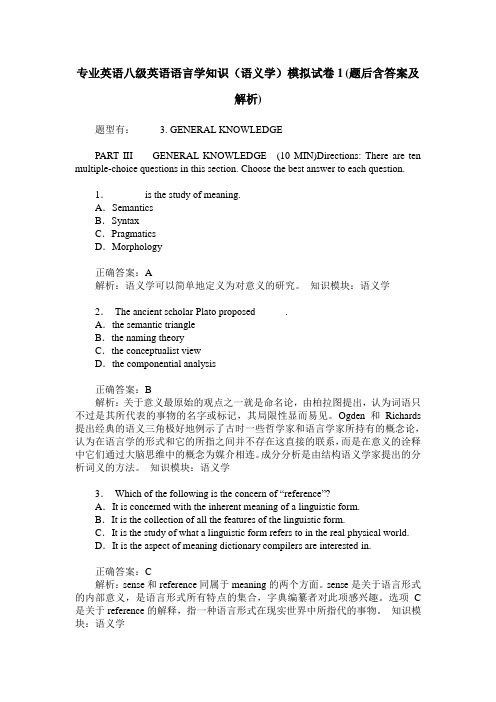
专业英语八级英语语言学知识(语义学)模拟试卷1(题后含答案及解析)题型有: 3. GENERAL KNOWLEDGEPART III GENERAL KNOWLEDGE (10 MIN)Directions: There are ten multiple-choice questions in this section. Choose the best answer to each question.1.______is the study of meaning.A.SemanticsB.SyntaxC.PragmaticsD.Morphology正确答案:A解析:语义学可以简单地定义为对意义的研究。
知识模块:语义学2.The ancient scholar Plato proposed______.A.the semantic triangleB.the naming theoryC.the conceptualist viewD.the componential analysis正确答案:B解析:关于意义最原始的观点之一就是命名论,由柏拉图提出,认为词语只不过是其所代表的事物的名字或标记,其局限性显而易见。
Ogden和Richards 提出经典的语义三角极好地例示了古时一些哲学家和语言学家所持有的概念论,认为在语言学的形式和它的所指之间并不存在这直接的联系,而是在意义的诠释中它们通过大脑思维中的概念为媒介相连。
成分分析是由结构语义学家提出的分析词义的方法。
知识模块:语义学3.Which of the following is the concern of “reference”?A.It is concerned with the inherent meaning of a linguistic form.B.It is the collection of all the features of the linguistic form.C.It is the study of what a linguistic form refers to in the real physical world.D.It is the aspect of meaning dictionary compilers are interested in.正确答案:C解析:sense和reference同属于meaning的两个方面。
语义翻译练习
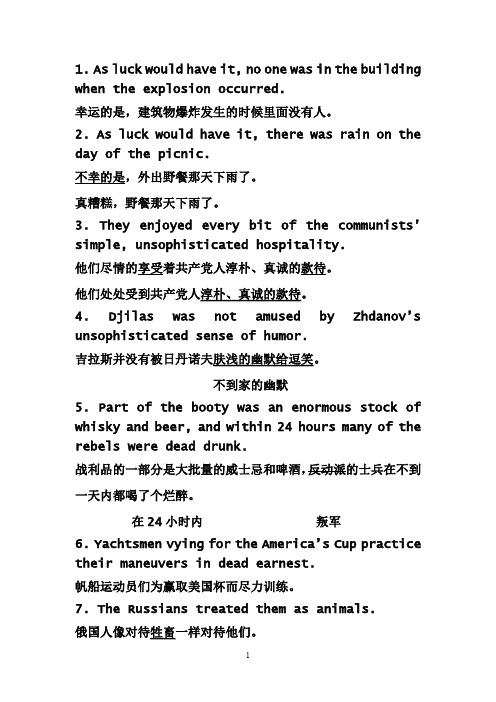
1. As luck would have it, no one was in the building when the explosion occurred.幸运的是,建筑物爆炸发生的时候里面没有人。
2. As luck would have it, there was rain on the day of the picnic.不幸的是,外出野餐那天下雨了。
真糟糕,野餐那天下雨了。
3. They en joyed every bit of the communists’ simple, unsophisticated hospitality.他们尽情的享受着共产党人淳朴、真诚的款待。
他们处处受到共产党人淳朴、真诚的款待。
4. Djilas was not amused by Zhdanov’s unsophisticated sense of humor.吉拉斯并没有被日丹诺夫肤浅的幽默给逗笑。
不到家的幽默5. Part of the booty was an enormous stock of whisky and beer, and within 24 hours many of the rebels were dead drunk.战利品的一部分是大批量的威士忌和啤酒,反动派的士兵在不到一天内都喝了个烂醉。
在24小时内叛军6. Yachtsmen vying for the America’s Cup practice their maneuvers in dead earnest.帆船运动员们为赢取美国杯而尽力训练。
7. The Russians treated them as animals.俄国人像对待牲畜一样对待他们。
8. Churchill said, “We are sea animals, and the United States are to large extent ocean animals.”丘吉尔说:“我们是海里的动物,美国人在很大程度上是洋里的动物。
5语义练习

5语义练习Semantics 练习1._______ is not included in Leech?s associative meaning.A. Connotative meaningB. Social meaningC. Collocative meaningD. Thematic meaning D2. Among Leech?s seven types of meaning is concerned with the relationship between a word and the thing it refers to _______.A. conceptualB. affectiveC. reflectedD. thematic A3. According to the referential theory, a word is not directly related to the thing it refers to. They are connected by ______.A. meaningB. referenceC. conceptD. sense C4.”Big” and “Small” are a pair of ______ opposites.A. complementaryB. gradableC. completeD. Converse B5. The pair of words “lend” and “borrow” are ______.A. gradable opposites B, converse oppositesC. co-hyponymsD. synonyms B6. A word with several meaning is called ______ word.A. a polysemousB. a synonymousC. an abnormalD. a multiple7. The semantic components of the word “gentleman” can be expressed as ___.A. +animate, +male, +human, -adultB. +animate, +male, +human, +adultA. +animate, -male, +human, -adult D. + animate, -male, +human, +adult B8. _____ is a phrase which can only be understood as a unit, not as a summation of the meaning of each constituent word.A. CollocationB. IdiomC. Semantic componentD. Synonym B9. In the triangle advanced by Ogden and Richards, “thought or reference” is____A. word, sentenceB. the objectC. conceptD. symbol B10. A linguistic is interested in _____.A. What is said.B. What is right both in syntax and in semantics. BC. What is grammaticalD. What ought to be said.11. The pair of words “lend” and “borrow” are _____.A. gradable oppositesB. relational oppositesC. synonymsD. co-hyponyms B12. Nouns, verbs, and adjectives can be classified as _____.A. Lexical wordsB. grammatical wordsC. function wordsD. form words A13. What is the meaning relationship between the two words “flower/tulip” ?A. PolysemyB. HomonymyC. HyponymyD. Antonymy C14. The words “railway”and “railroad” are _____.A. synonyms differing in emotive meaningB. dialectal synonymsC. collocationally-restricted synonymsD. synomyms differing in styles B15. The pair of words “wide/narrow” are called____.A. gradable oppositesB. complementary antonymsC. co-hyponymsD. relational opposites A16. Which of the following two-term sets shows the feature of complementaries?A. single/marriesB. lend/borrowC. hot/coldD. old/young AII. Answer the questions with “Y es”or “No” .1.Is reference tied to a particular time and place? Y2.Every word in a language can find at least one referent in the objective world. ?N3.Can different expressions have the same referent? Y4.Can reference be applied to words such as “and” ,”very” in English? NIII.State t he following sentences “True” or “False”.1. Sense is regarded as a kind of intra-linguistic relationship. T2. In most cases, “sense ” and “meaning” are different terms for the same thing.T3. Every word has its own sense. F4. A word may have several different senses and several words may have the samesense. T5. Extension, like denotation, is a kind of relation between elements and theobjective world. T6. Extension can only be applied to the things at present. F7. The relation between extension and intension is the same as that betweendenotation and sense. T8. People of different cultures may choose different prototype for the samepredicate, e.g. …bus?. T9. All the words in a language can be used to refer , but only some have sense. F10. Two synonymous words must be identical in sense in every dimension. F11. There are very few perfect synonyms in a language. T12. Entailment is more inclusive than paraphrase. T13. Almost every word in a dictionary is polysemic. T14. Dry and wet are a pair of gradable antonyms. T15. Innocent and guilt are a pair of relative antonyms. F Complementary16. The relationship between the Argument and Predicate is Subject to predicate. F17. The meaning of each expression can be defined in terms of its semanticcomponents so as to contrast with the meaning of all the expressions in the same language. T18. The proposition of a sentence may be more simply stated as a verb and aselection of case ---categories. T19. According to case grammar, the part of proposition in a sentence is a tensed setof relationships between a verb and a noun phrase ( or noun phrases).IV. What role does each of the underlined phrases play?1.John hit Fred on the head with a brick.A Ex Loc Ins2.James heard the news from Peter. Ex. O Source3.Mr. Smith made a vase out of this clay. A Resu Source4.These books were given to my sister by John. O Bene A5.Smoke filled the room. Ins LocV. Do the following pairs of sentences synonymous? What is the difference between them.1.He refused her invitation. GeneralHe declined her incitation. polite Y2.The young man had no gust to face the reality. ColloquialThe young man had no courage to face the reality. Y general3. A torrent of rain inundated the basement. literaryA torrent of rain flooded the basement. common4. His proposal was turned down by the committee. colloquialHis proposal was rejected by the committee intense5.Susan has recently rented a flat in this area. BESusan has recently rented an apartment in this area. AE6.Eric bought a new car for his parents on the day of their 25th anniversary. genEric purchased a new car for his parents on the day of their 25th anniversary.formal7.They came to pay their respect to the deceased. professionalThey came to pay their respect to the dead. General8.This stuff has a bad smell. slangThis material has a bad smell. CommonVI. Write down the logic formulae for the following simple propositions:1.John loves his family. L(j,f)2.Matha is the aunt of Peter. Aunt (m,p)3.Jack is lying in bed. Lie (j, b)4.Ellen is proud of her son. Proud (e, s)5.Jim returned the book to the professor. Return (j,b, p)VII. Fill in the blanks in the following passage by choosing the appropriate word.Semantics is the study of ______(1) of language. It is one of the three components of _______(2) . According to Chomsky?stheory , it is at the _______(3) level of language. Semantics concentrates on the _______(4) between languages, rather than on the _______(5).Most language utterances(话语)depend for their interpretation upon the ________(6) in which they are used, and the vast majority of them have a ________(7) range of meanings than first come to mind. It may seem to you thatmeaning is so vague, insubstantial, and elusive that it is impossible to come to any clear, concrete, or tangible conclusions about it. Although many kinds of behavior can be described as _______(8), the range, diversity and complexity of meaning expressed in language is unmatched in any other human or non-human communicative behavior. And linguistic________(9) ----the study of meaning in language was neglected very largely in the past because meaning was felt to be inherently ______(10) and at least temporarily beyond the scope of ______(11) investigation. Largely as a result of Chomsky?s theory of ______ (12) grammar, and the technical advances made in linguistics, in logic and philosophy of _______(13) , linguistic semantics is currently enjoying a very considerable revival of interest.1. A. grammar B. structure C. phonetics D. meaning2. A. linguistics B. grammar C. morphology D. syntax3. A. surface structure B. deep structure C. linguistic D. philosophical4. A. form B. similarity C. differences D. meaning5. A. substance B. difference C. similarities D. grammar6. A. words B. sentences C. structure D. context7. A. wider B. narrower C. more accurate D. clearer8. A. productive B. effective C. informative D. communicative9. A. stylistics B. philosophy C. semantics D. grammar10. A. stable B. unstable C. social D. arbitrary11. A. independent B. philosophical C. linguistic D. human12. A. traditional B. transformational C. structural D. systemic13. A. language B. semantics C. the world D. human mind.D A B B B D A D C B D B A。
英语语义分析练习题
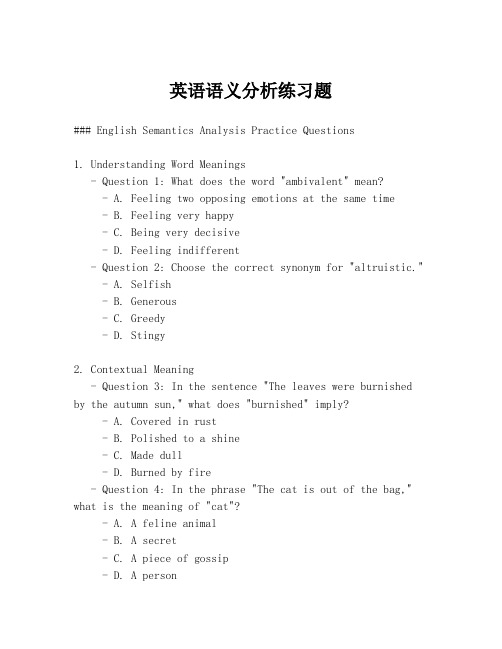
英语语义分析练习题### English Semantics Analysis Practice Questions1. Understanding Word Meanings- Question 1: What does the word "ambivalent" mean?- A. Feeling two opposing emotions at the same time- B. Feeling very happy- C. Being very decisive- D. Feeling indifferent- Question 2: Choose the correct synonym for "altruistic." - A. Selfish- B. Generous- C. Greedy- D. Stingy2. Contextual Meaning- Question 3: In the sentence "The leaves were burnished by the autumn sun," what does "burnished" imply?- A. Covered in rust- B. Polished to a shine- C. Made dull- D. Burned by fire- Question 4: In the phrase "The cat is out of the bag," what is the meaning of "cat"?- A. A feline animal- B. A secret- C. A piece of gossip- D. A person3. Idiomatic Expressions- Question 5: What does the idiom "break the ice" mean? - A. To start a fight- B. To initiate a conversation- C. To stop a conversation abruptly- D. To cool down a heated argument- Question 6: The phrase "spilled the beans" is used to describe which action?- A. Cleaning up a mess- B. Telling a secret- C. Cooking a meal- D. Planting seeds4. Word Relationships- Question 7: Which word is the antonym of "extrovert"? - A. Introvert- B. Extroverted- C. Ambiverted- D. Outgoing- Question 8: The word "antidote" is related to which of the following?- A. A poison- B. A cure- C. A symptom- D. A disease5. Syntactic Analysis- Question 9: In the sentence "The dog chased the cat up the tree," what is the direct object of the verb "chased"? - A. The dog- B. The cat- C. Up- D. The tree- Question 10: Identify the subject of the sentence "Running in the park is good for health."- A. The park- B. Running- C. Health- D. Good6. Semantic Roles- Question 11: In the sentence "She baked a cake for her friend," what is the semantic role of "her friend"?- A. Agent- B. Patient- C. Recipient- D. Instrument- Question 12: In the sentence "The storm destroyed the house," what is the semantic role of "the storm"?- A. Theme- B. Agent- C. Patient- D. Location7. Pragmatics- Question 13: If someone says, "Can you pass the salt?" at the dinner table, what is the implied meaning?- A. They are asking if you are capable of passing the salt.- B. They are asking for the salt to be passed to them. - C. They are commenting on the quality of the food.- D. They are asking if the salt is available.- Question 14: What is the implied meaning of the statement "You look nice today"?- A. The person's appearance is different from usual. - B. The person is dressed inappropriately.- C. The speaker is complimenting the person's appearance.- D. The person is not usually nice.8. Pronoun Reference- Question 15: In the sentence "John told Mary that he would help her with the project," what does the pronoun "he" refer to?- A. John- B. Mary- C. The project- D. The sentence does not provide enough information.9. Ambiguity Resolution- Question 16: The sentence "I saw the man with the telescope" can be ambiguous. What are two possible interpretations?- A. The man had a telescope, and I saw him.- B. I used a telescope to。
Semantics语义学练习

Semantics语义学练习Semantics(语义学)练习I. Fill in each of the following blanks with one word which begins with the letter given.1. Semantics, one of the linguistic branches, can be simply defined as the study of meaning.2.Reflected meaning refers to what is communicated through association with another sense of the same expression.3.Contextualism means that one can derive meaning from observable contexts which include situational context and the linguistic context.4.Semantic triangle is a theory proposed by Ogden and Richards in The Meaning of Meaning, which argues that the relation between a word and a thing it refers to is not direct. It is mediated by concept.5.Synonymy refers to the sameness or close similarity of meaning.6.Hyponymy is a matter of class membership. The upper term in this sense relation, i.e. theclass name, is called superordinate, and the lower term the members, hyponyms.7. Componential analysis is a way proposed by the structural semanticists to analyze meaning.8.Antonyms can be categorized into three types, namely gradable antonyms, complementary antonyms, and converse antonyms or relational opposites.9.Sense and reference are two terms often encountered in the study of meaning. They are two related but different aspects of meaning.10. Predication analysis is a way to analyze sentence meaning.II.1. “Can I borrow your bike?” _________ “You have a bike.”A. is synonymous withB. is inconsistent withC. entailsD. presupposes2. __________ is a way in which the meaningof a word can be dissected into meaning components, called semantic feature.A. Predication analysisB. Componential analysisC. Phonemic analysisD. Grammatical analysis3. Relation between proposition by which A presupposes B, if for A to have a truth value, B must be true is called__________.A. presuppositionB. entailmentC. contradictionD. synonymy4._____________ deals with the relationship between the linguistic element and the non-linguistic world of experience.A. ReferenceB. ConceptC. SemanticsD. Sense5.Words that are close in meaning are called __________.A. homonymsB. polysemyC. hyponymsD. synonyms6. The relationship between “X buys something from Y.” and “Y sells something toX.” is ___________.A. complementary antonymyB. converse antonymyC. hyponymyD. gradable antonymy7. The relationship between “furniture”and “desk” is __________.A. superordinateB. relational oppositesC. hyponymyD. synonymy8. The sentence “John likes ice-cream”contains _________ arguments.A. oneB. twoC. noneD. three9. Bloomfield drew on __________ psychology when trying to define the meaning of linguistic forms.A. contextualB. conceptualistC. behavioristD. naming10. Words that are opposite in meaning are __________.A. synonymsB. hyponymsC. antonymsD. homophonesIII.IV. Answer the following questions.1. Identify the type of antonymy holding between the words in each of the pair.1) hot cold2) husband wife3) present absent2. How do you distinguish entailment and presupposition in terms of truth values?(星⽕p.108)I.1.Semantics2.Reflected3.situational4.triangle5.Synonymy6.superordinate/doc/6b18280.htmlponential8. complementary9. reference 10. PredicationII. 1.D 2.B 3.A 4.A 5.D 6. B 7. C 8.B 9. C 10.CIII.1. 1) hot cold gradableantonymy2) husband wife converse antonymy3) present absent complementary antonymhy。
考研英语语义练习
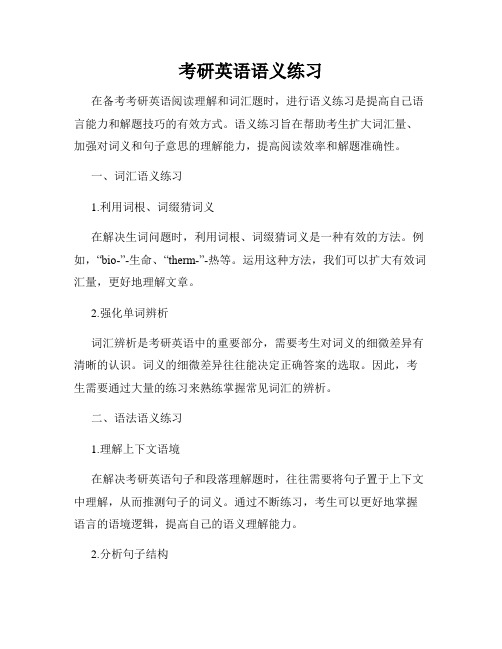
考研英语语义练习在备考考研英语阅读理解和词汇题时,进行语义练习是提高自己语言能力和解题技巧的有效方式。
语义练习旨在帮助考生扩大词汇量、加强对词义和句子意思的理解能力,提高阅读效率和解题准确性。
一、词汇语义练习1.利用词根、词缀猜词义在解决生词问题时,利用词根、词缀猜词义是一种有效的方法。
例如,“bio-”-生命、“therm-”-热等。
运用这种方法,我们可以扩大有效词汇量,更好地理解文章。
2.强化单词辨析词汇辨析是考研英语中的重要部分,需要考生对词义的细微差异有清晰的认识。
词义的细微差异往往能决定正确答案的选取。
因此,考生需要通过大量的练习来熟练掌握常见词汇的辨析。
二、语法语义练习1.理解上下文语境在解决考研英语句子和段落理解题时,往往需要将句子置于上下文中理解,从而推测句子的词义。
通过不断练习,考生可以更好地掌握语言的语境逻辑,提高自己的语义理解能力。
2.分析句子结构对于复杂句和长句,考生需要进行句子结构分析,找出句子成分之间的联系。
通过这种分析,考生可以更好地理解句子的意思,从而更准确地选择答案。
三、阅读语义练习1.选择关键信息在解决完形填空和阅读理解题时,选择关键信息是非常重要的。
考生需要识别文章中提到的关键信息,并加以利用,从而解答题目。
通过不断练习,考生可以提高自己的关键信息识别能力。
2.理解段落主旨在解决词汇、句子和段落理解题时,考生需要理解段落的主旨,从而判断答案。
通过不断进行这种练习,考生可以提高自己理解文章结构和主旨的能力。
四、拓展语义练习1.活用词汇在进行语义练习时,考生需要学会积累、活用和转化所学到的词汇。
通过将所学词汇应用到不同的语境中,考生可以提高自己的语义理解和词汇灵活运用能力。
2.采用多种学习资源考生可以通过阅读英语原版书籍、报纸杂志、听英语广播和新闻等方式,拓宽自己的语言素材和语言能力。
通过多种来源的语料,考生可以更好地识别和理解词汇和语义。
总结起来,语义练习是提高考研英语能力的重要环节。
考研英语词汇语义联想历年真题2024精选
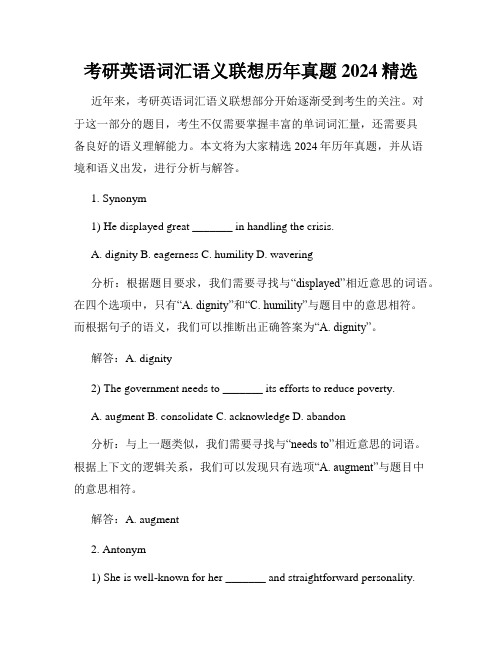
考研英语词汇语义联想历年真题2024精选近年来,考研英语词汇语义联想部分开始逐渐受到考生的关注。
对于这一部分的题目,考生不仅需要掌握丰富的单词词汇量,还需要具备良好的语义理解能力。
本文将为大家精选2024年历年真题,并从语境和语义出发,进行分析与解答。
1. Synonym1) He displayed great _______ in handling the crisis.A. dignityB. eagernessC. humilityD. wavering分析:根据题目要求,我们需要寻找与“displayed”相近意思的词语。
在四个选项中,只有“A. dignity”和“C. humility”与题目中的意思相符。
而根据句子的语义,我们可以推断出正确答案为“A. dignity”。
解答:A. dignity2) The government needs to _______ its efforts to reduce poverty.A. augmentB. consolidateC. acknowledgeD. abandon分析:与上一题类似,我们需要寻找与“needs to”相近意思的词语。
根据上下文的逻辑关系,我们可以发现只有选项“A. augment”与题目中的意思相符。
解答:A. augment2. Antonym1) She is well-known for her _______ and straightforward personality.A. elusiveB. cynicalC. deceitfulD. gullible分析:根据句子中的“well-known for”可以推断出答案与“A. elusive”、“B. cynical”、“C. deceitful”都不符合。
而选项“D. gullible”与意思相反,因此是正确答案。
解答:D. gullible2) The company's financial situation has improved _______ over thepast year.A. steadilyB. dramaticallyC. significantlyD. consistently分析:根据句子中的“improved”和“over the past year”,我们可以推测出答案与“A. steadily”、“C. significantly”、“D. consistently”都不符合。
考研英语翻译防止表达失误词义引申训练题21例
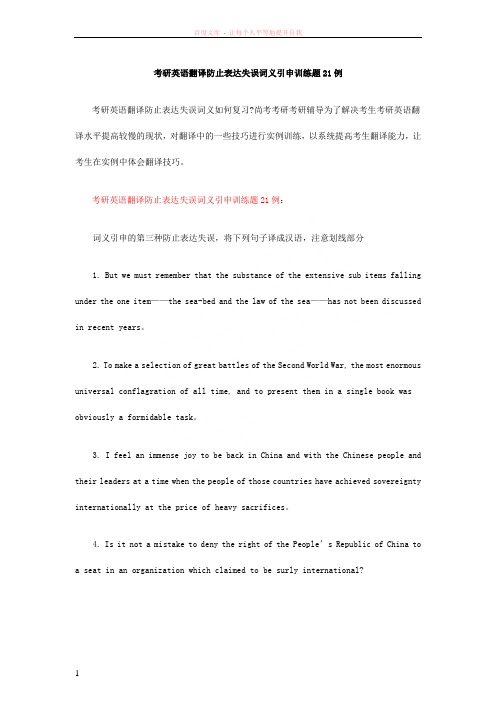
考研英语翻译防止表达失误词义引申训练题21例考研英语翻译防止表达失误词义如何复习?尚考考研考研辅导为了解决考生考研英语翻译水平提高较慢的现状,对翻译中的一些技巧进行实例训练,以系统提高考生翻译能力,让考生在实例中体会翻译技巧。
考研英语翻译防止表达失误词义引申训练题21例:词义引申的第三种防止表达失误,将下列句子译成汉语,注意划线部分1. But we must remember that the substance of the extensive sub items falling under the one item——the sea-bed and the law of the sea——has not been discussed in recent years。
2. To make a selection of great battles of the Second World War, the most enormous universal conflagration of all time, and to present them in a single book was obviously a formidable task。
3. I feel an immense joy to be back in China and with the Chinese people and their leaders at a time when the people of those countries have achieved sovereignty internationally at the price of heavy sacrifices。
4. Is it no t a mistake to deny the right of the People’s Republic of China toa seat in an organization which claimed to be surly international?5. The principal person judged to be aimed at through the clause was one who had long previously attracted to himself a share of attention in many cities, whose influence was beginning to be felt among the working class。
考研英语阅读理解之“语义题”
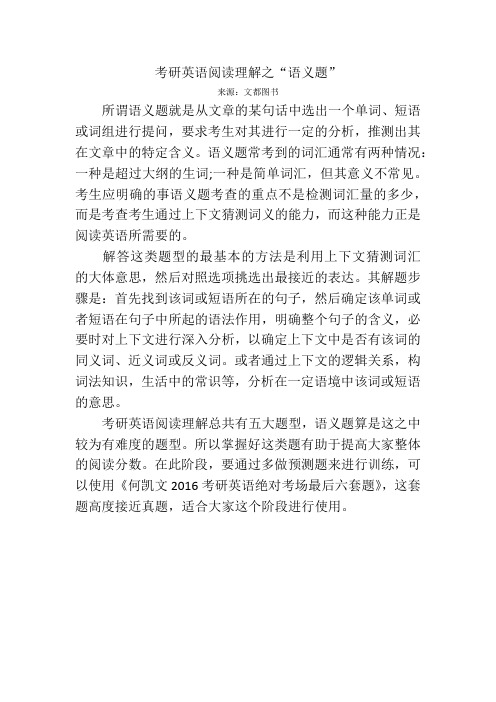
考研英语阅读理解之“语义题”
来源:文都图书
所谓语义题就是从文章的某句话中选出一个单词、短语或词组进行提问,要求考生对其进行一定的分析,推测出其在文章中的特定含义。
语义题常考到的词汇通常有两种情况:一种是超过大纲的生词;一种是简单词汇,但其意义不常见。
考生应明确的事语义题考查的重点不是检测词汇量的多少,而是考查考生通过上下文猜测词义的能力,而这种能力正是阅读英语所需要的。
解答这类题型的最基本的方法是利用上下文猜测词汇的大体意思,然后对照选项挑选出最接近的表达。
其解题步骤是:首先找到该词或短语所在的句子,然后确定该单词或者短语在句子中所起的语法作用,明确整个句子的含义,必要时对上下文进行深入分析,以确定上下文中是否有该词的同义词、近义词或反义词。
或者通过上下文的逻辑关系,构词法知识,生活中的常识等,分析在一定语境中该词或短语的意思。
考研英语阅读理解总共有五大题型,语义题算是这之中较为有难度的题型。
所以掌握好这类题有助于提高大家整体的阅读分数。
在此阶段,要通过多做预测题来进行训练,可以使用《何凯文2016考研英语绝对考场最后六套题》,这套题高度接近真题,适合大家这个阶段进行使用。
- 1、下载文档前请自行甄别文档内容的完整性,平台不提供额外的编辑、内容补充、找答案等附加服务。
- 2、"仅部分预览"的文档,不可在线预览部分如存在完整性等问题,可反馈申请退款(可完整预览的文档不适用该条件!)。
- 3、如文档侵犯您的权益,请联系客服反馈,我们会尽快为您处理(人工客服工作时间:9:00-18:30)。
练习一、根据词语搭配辨析词义。
以常见的形容词good为例:1. good saying名2. 言3. good boy乖孩子4. good child孝子5. good contract有效的合同6.7. good debt有把握收回的债8. good eggs新鲜的鸡蛋9. good eyesight正常的视力10. good father慈父11. good features漂亮的相貌12. good friend挚友13. good friend益友14. good idea妙计15. good investment可靠的投资16. good joke有趣的笑话17. good looks美貌18. good luck鸿运19. good manners得体的举止20. good match佳偶、劲敌21. good mother良母22. good neighbor睦邻23. good reason充足的理由24. good soil肥沃的土地25. good teacher良师26. good wife贤妻二、根据上下文翻译develop一词:1 His plane developed engine trouble only seven miles after takeoff. (发生故障)2 Modern aircraft are so heavy that the wings must develop a very large lift force in order to sustai n the aircraft. (产生升力)3 Inspired by these ideas, in 1752 Franklin developed a practical lightning rod. (发明避雷针)4 A hypothesis is a specific statement developed by a scientist from observations.(得出论断)5 Until the domain theory of magnetism was developed, they did not have much success. (提出理论)6 To develop the capabilities of the geophysical prospecting, the renewal of the techniques and eq uipment is the first thing to be considered. (提高能力)7 Most of the money came from selling the secret of a new type of potato he had developed. (培育新品种)8 As young Goddard grew into manhood, he developed tuberculosis. (患上结核病)9 We must develop all the natural substances in our country which can make us rich.(开发资源)10 Several attempts have been made through the years to develop the deposit.(开采矿床)三、练习:and的翻译。
And在以下各例中,and都不宜译作“和”、“与”、“并且”。
1. He did the work, and he did it very well.2. He read for an hour and went to bed.3. The sun came out and the grass dried.4. I went to his house, and he came to mine.5. He is so rich and lives like a beggar.6. Rust is abrasive and can cause damage to the injection components.7. Chemical splashes can cause eye irritation and permanent eye damage.8. These parts are made of woods or plastics and not metals.9. This means drying the oil before it enters the system and, to be sensible, ensuring that the air ab ove the oil is dry.10. One step more, and you are a dead man.f1. 他干了这件工作,并且干得挺好。
f2. 他看了一个钟头的书,然后就睡觉了。
f3. 太阳一出,草就干枯了。
f4. 我上他家去,而他却到我家来。
f5. 他那么有钱,却生活得像个乞丐。
f6. 锈具有腐蚀性,所以能损坏喷射元件。
f7. 化学制品的溅沫会使眼睛发炎,甚至会造成永久性伤害。
f8. 这些零件是用木材或塑料制成的,而不是金属制成的。
Well在以下各例中,well都不宜译作“好”。
1. The bridge was so well built that it lasted for 100 years.2. The demand for electricity may get well below the average level.3. Radar waves go through clouds or fog quite well, whereas light waves do not.4. This paper is well written except for a little miscalculation.5. The temperature is well above the set value.6. The house is well situated.7. Shake the bottle well before experiment.8. It may well be true.9. Plants can’t grow well in the absence of water.10. Examine the account well before you pay it.f1. 桥建得很牢,至少能用100年。
f2. 电的需求量可能远远低于平均水平。
f3. 雷达波能非常容易地穿过云和雾,而光波却不行。
f4. 这篇论文写得不错,不过有一点儿计算失误。
f5. 温度大大高于定值。
f6. 房屋的地理位置十分优越。
f7. 实验之前将瓶内液体摇晃均匀。
f8. 这很可能是真的。
f9. 没有水植物就不能茁壮生长。
f10. 付款之前须仔细核实账目。
Last: 在以下各例中,last都不宜译作“最后”。
1. He is the last man to accept a bribe.2. He is the last man for such a job.3. He is the last man to consult.4. Bikini was the last thing she‘d like to wear.5. He should be the last man to blame.6. This is the last place where I expected to meet you.7. Money is the last thing he wants, and you won’t succeed by offering it.8. This would be the last place the colonialists would leave, for in it lay riches and natural resource s.f1. 他决不会受贿。
f2. 他最不适合这项工作。
f3. 他根本不值得请教。
f4. 她最不喜欢穿比基尼泳装。
f5. 怎么也不应该责备他。
f6. 怎么也没想到我会在这个地方见到你。
f7. 他决不想要你的钱,你给他钱也白搭。
f8. 这是殖民主义者最不愿意离开的地方,因为这里的自然资源极为丰富。
challenge在以下各例中,challenge都不宜译作“挑战”。
1. I challenge my own conclusion.2. I challenge you to answer the question.3. China challenges the world in discipline. .4. Recent discoveries have challenged the old notions.5. His question challenges us to think.6. Survival in enemy-occupied territory challenged skill.f1. 我要重新考虑我的结论。
f2. 我谅你答不出这个问题。
f3. 中国的纪律居世界第一。
f4. 最近的一些发现使一些老观念成了问题。
f5. 他的问题促使我们思考。
f6. 在敌占区生存需要有高超的技术。
Delicatedelicate skin娇嫩的皮肤delicate porcelain精致的瓷器delicate upbringing娇生惯养delicate living奢侈的生活delicate health虚弱的身体delicate stomach容易吃坏的胃delicate vase容易碰碎的花瓶delicate diplomatic question微妙的外交问题delicate difference讲不大清楚的差别delicate surgical operation难做的外科手术delicate ear for music对音乐有鉴赏力delicate sense of smell灵敏的嗅觉delicate touch生花妙笔delicate food美味的食物三、注意语义分析1. 根据词性确定词义:1) He saw a man sawing trees with a saw.他看见一个人正用锯子锯树2) Needing some light to see by, the burglar crossed the room with a light step to light the light with the light green shade.3) Eat what you can and can what you cannot.能吃的吃掉,吃不掉的就做成罐头。
